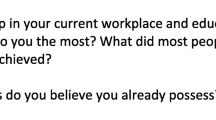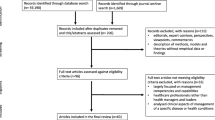Abstract
Leadership is a crucial component to the success of academic health science centers (AHCs) within the shifting U.S. healthcare environment. Leadership talent acquisition and development within AHCs is immature and approaches to leadership and its evolution will be inevitable to refine operations to accomplish the critical missions of clinical service delivery, the medical education continuum, and innovations toward discovery. To reach higher organizational outcomes in AHCs requires a reflection on what leadership approaches are in place and how they can better support these missions. Transactional leadership approaches are traditionally used in AHCs and this commentary suggests that movement toward a transformational approach is a performance improvement opportunity for AHC leaders. This commentary describes the transactional and transformational approaches, how they complement each other, and how to access the transformational approach. Drawing on behavioral sciences, suggestions are made on how a transactional leader can change her cognitions to align with the four dimensions of the transformational leadership approach.
Similar content being viewed by others
References
Avolio, B. J., Bass, B. M., & Zhu, F. W. W. (2004). Multifactor leadership questionnaire: manual and sampler set. Menlo Park, CA: Mind Garden.
Banaji, M. R. (2013). Blindspot: Hidden biases of good people. New York: Random House.
Bass, B. M. (1985). Leadership and performance beyond expectations. New York: The Free Press.
Burns, J. M. (1978). Leadership. New York: Harper and Row.
Chemers, M. (1997). An integrative theory of leadership. Hillsdale, NJ: Lawrence Erlbaum Associates.
Downton, J. V. (1973). Rebel leadership: Commitment and charisma in the revolutionary process. New York: The Free Press.
Frisina, M. (2011). Influential leadership: Change your behavior, change your organization, change health care. Chicago: Health Forums Inc.
Grant, A. (2013). Give and take: A revolutionary approach to success. New York: The Penguin Group.
Greenwald, A. G., McGhee, D. E., & Schwartz, J. K. L. (1998). Measuring individual differences in implicit cognition: The implicit association test. Journal of Personality and Social Psychology, 74, 1464–1480.
Howell, J. M., & Avolio, B. J. (1993). Transformational leadership, transactional leadership, locus of control, and support for innovation: Key predictors of consolidated business-unit performance. Journal of Applied Psychology, 78, 891–902.
Lazarus, A. A. (1971). Behavior therapy and beyond. New York: McGraw-Hill.
Murnighan, J. K. (2012). Do nothing! How to stop overmanaging and become a great leader. New York: Penguin Books.
Prochaska, J. O., & DiClemente, C. C. (1984). The transtheoretical approach: Crossing traditional boundaries of therapy. Homewood, IL: Dow Jones-Irwin.
Rudman, L. A., Ashmore, R. D., & Gary, M. L. (2001). “Unlearning” automatic biases: The malleability of implicit prejudice and stereotypes. Journal of Personality and Social Psychology, 81, 856–868. doi:10.1037/0022-3514.81.5.856.
Skinner, B. F. (1953). Science and Human Behavior. New York: The Free Press.
Souba, W. (2015). Health care transformation begins with you. Academic Medicine, 90, 139–142. doi:10.1097/ACM.0000000000000534.
Wiseman, L. (2010). Mulitipliers: How the best leaders make everyone smarter. New York: HarperCollins Publishers.
Author information
Authors and Affiliations
Corresponding author
Ethics declarations
Conflict of interest
Patrick O. Smith declares that he has no conflict of interest.
Human and Animal Rights and Informed Consent
No animal or human studies were carried out by the author for this article.
Rights and permissions
About this article
Cite this article
Smith, P.O. Leadership in Academic Health Centers: Transactional and Transformational Leadership. J Clin Psychol Med Settings 22, 228–231 (2015). https://doi.org/10.1007/s10880-015-9441-8
Published:
Issue Date:
DOI: https://doi.org/10.1007/s10880-015-9441-8




